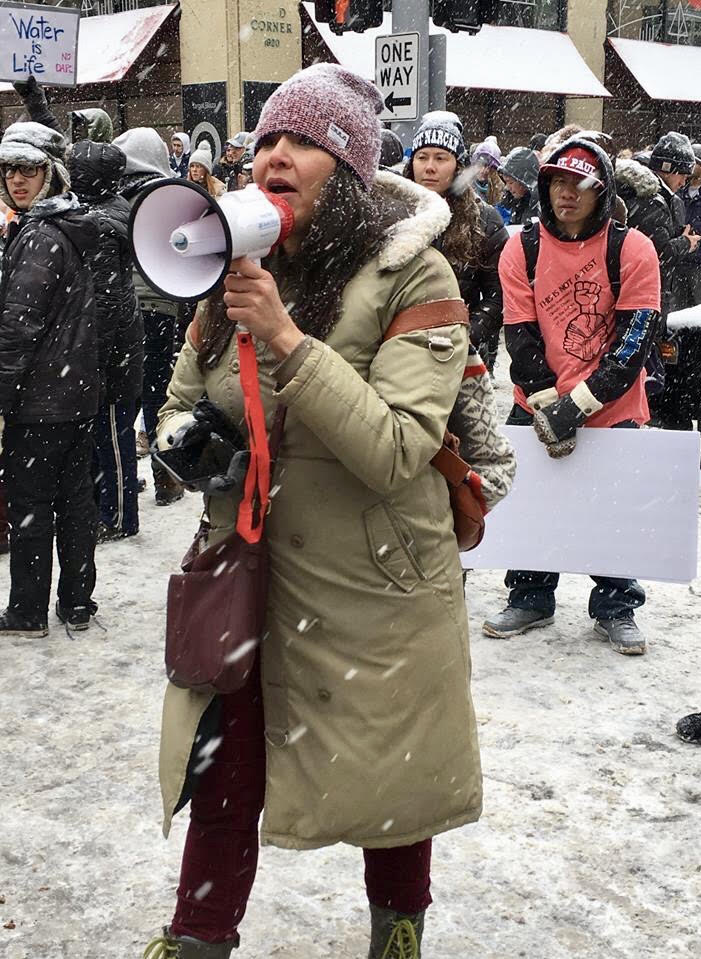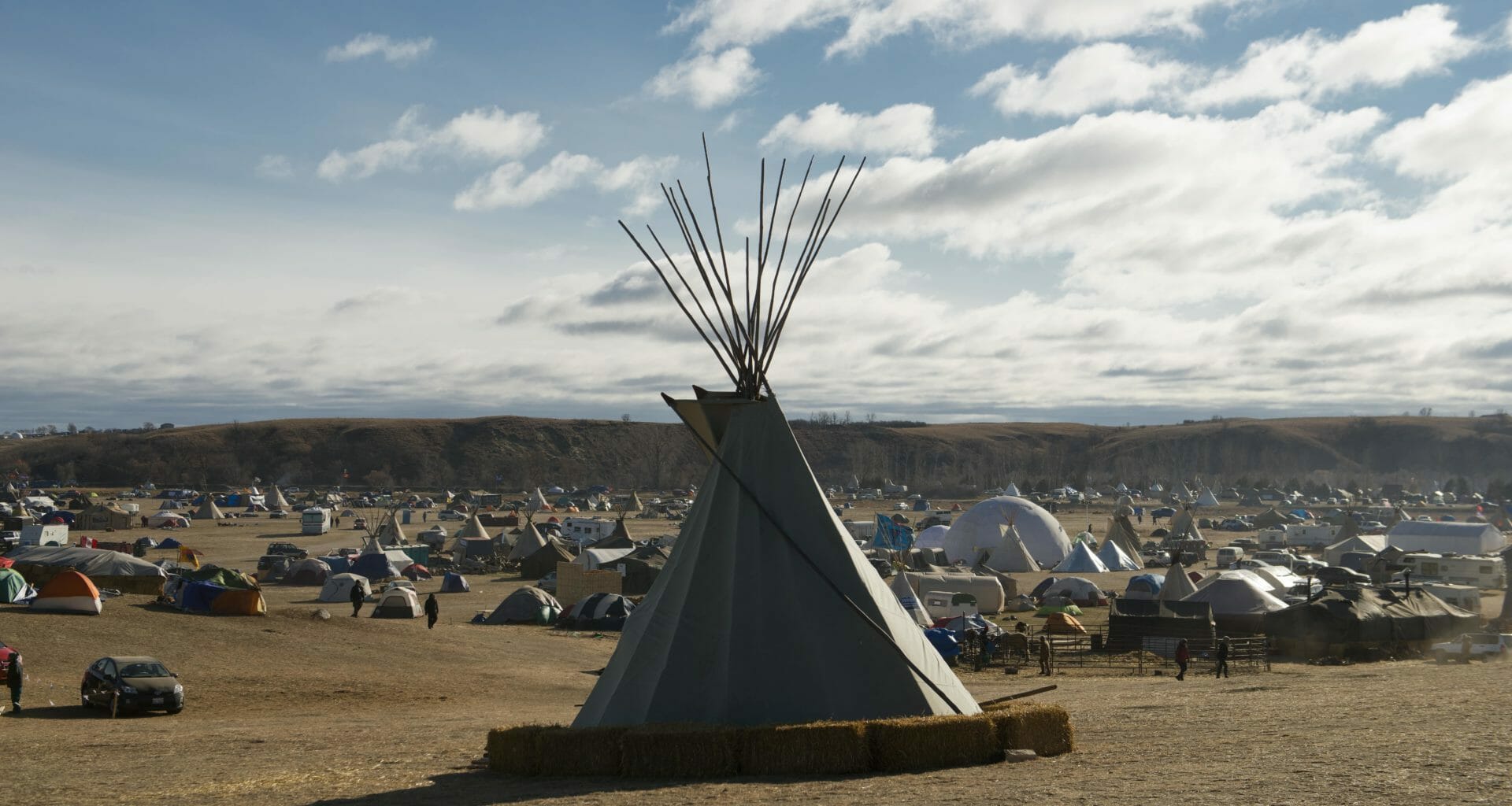An Indigenous leader from North America has accused workers on oil and gas projects in the US and Canada of human rights abuses.
Sikowis – a campaigner who led resistance against the Dakota Access oil pipeline in North Dakota – told The Ferret that workers on some industrial projects have been responsible for sexual attacks on women and children.
Sikowis, also known as Christine Nobiss, is Plains Cree-Saulteaux of the George Gordon First Nation in Saskatchewan, and founder of the Great Plains Action Society.
She was due to visit Glasgow for COP26 and talk about human rights violations but chose not to come because of the Covid-19 pandemic. Instead, she gave online talks to both Glasgow Women’s Library and Stirling University.
Ahead of those events, she spoke to The Ferret online from her home in Iowa City, about the problems facing Indigenous peoples in the US and Canada – including violence against women, murder rates and thousands of unsolved disappearances.
On the environment, Sikowis accused corporate industries of exploiting the “land, water and air” in First Nations’ territories. She said the influx of temporary workers into Indigenous communities as a result of extractive projects has led to rising incidents of sexual abuse and violence.

“The stories testified are so sad and horrendous that I don’t even want to talk about it – but let’s just say they have to do with children as young as three years old, and young boys,” said Sokiwis, a mother of three children.
In 2019 she gave a presentation in New York City to the United Nations (UN) to spotlight problems caused by large construction, oil and mineral projects, which often involve temporary workforces being housed in so-called man-camps close to Indigenous communities.
The UN was told by Sikowis that the Bakken oil boom in Montana and North Dakota resulted in Native American communities reporting increased rates of human trafficking for sexual exploitation. In her address, Sikowis cited problems with the construction of the Mount Milligan Mine in British Columbia on the Nak’azdli and Tl’azt’en First Nations territories.
She said a study in Canada found the local community experienced a 48 per cent increase in assaults with a weapon, a 50 per cent increase in aggravated assaults and a 38 per cent increase in sexual assaults. There was also a 37 per cent increase in missing people reports. Similar issues are prevalent in the US.
“I really do think this country still has that mentality that Indigenous people are less than human – they don’t matter as much. We face that (violence) from within and outside of our communities,” Sikowis told The Ferret.
“Within our communities we have the highest rates of domestic violence in the country, the highest rates of alcoholism and drug abuse, and poverty. I think at some point in the past ten years some reservations had an unemployment rate of 80 percent. There’s a lot of pain in our communities.”
She has been interested in environmental issues since studying the effects of acid rain on Native communities as a teenager. In 2017 she was involved in protests against a controversial oil pipeline in North Dakota, establishing Little Creek Camp, which became a hub of opposition.
Native American tribes, including the Standing Rock Sioux, opposed the construction of the pipeline which destroyed sacred artifacts and posed a threat to Lake Oahe, a critical drinking supply, and the greater Missouri River.
The £2.8bn pipeline – 1200 miles long – transports crude oil a day across four states, from North Dakota to a terminal in Illinois, where it can be shipped to refineries. Great Plains Action Society, founded in 2015 by Sikowis, turned into a full-fledged organisation during the fight against the pipeline.
Sikowis also works to highlight incredibly high murder rates and disappearances of thousands of Indigenous people, in a campaign called Missing and Murdered Indigenous Relatives (MMIR).
“On some reservations the murder rate of Indigenous women is ten times higher than the national average,” she explained. “The missing persons database in the US has close to 6000 missing (Indigenous) women and that number is severely under-represented. In Canada they say the number is about 1200 missing native women, which is high for Canada’s population. But grassroot folks say that number can be as high as four to five thousand. We have the highest rates of sexual assault in our country.”
Citing the recent case of a 22 year old white woman called Gabby Petito, who went missing in the US in July, Sikowis said American society hardly reacts when Indigenous females disappear. Petito’s body was found in a national park in Wyoming nearly two weeks after she was reported missing.
“The whole nation went insane,” Sikowis said. “The amount of resources put towards her search was unbelievable. I think at the time 710 Indigenous people had been reported missing between 2011 and 2020 in Wyoming. It’s always like that here. There is little to no coverage about any of our women or children that go missing, but if a white woman or child goes missing the whole country goes absolutely insane.
She added: “It makes you feel like you don’t matter. If I go missing it doesn’t matter – it makes me feel insignificant, it makes me feel less than human.”
Great Plains Action Society currently supports four families grieving after murders including three women killed on the Winnebago, Omaha and Nebraska reservations.
The fourth family being helped mourns Zachary Bear Heels, a mentally ill Native man killed by US police in 2017. Omaha police used a stun gun on Heels 12 times and punched him in the head, even while he was handcuffed. The killing sparked street protests.
Sikowis spoke during COP26 at online events organised by both the Glasgow Women’s Library and the University of Stirling.
Readers can watch the Glasgow Women’s Library online event here – https://www.youtube.com/watch?v=bKGNTmvXWSI
Photo thanks to iStock and Alexander Gouletas














